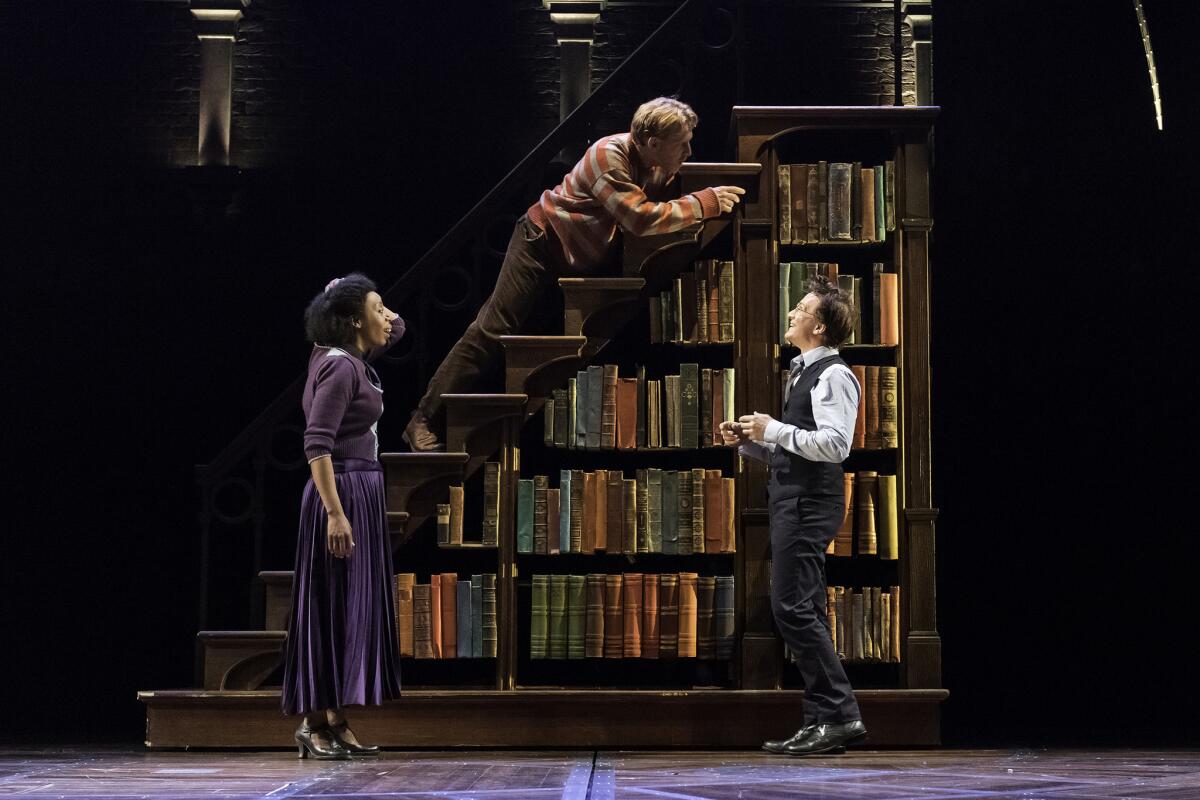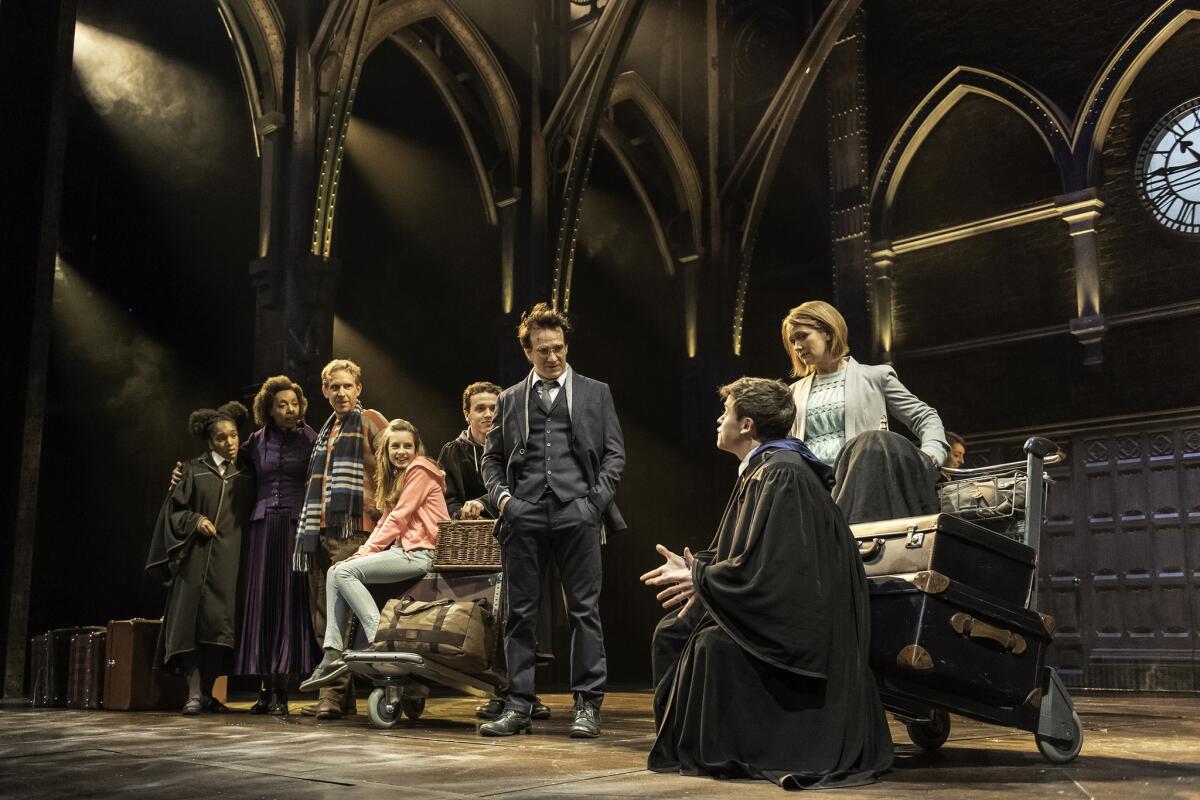Review: âHarry Potter and the Cursed Childâ reminds us of the power of courage in the face of evil
The sorcery behind âHarry Potter and the Cursed Childâ â the eighth story in the J.K. Rowling series, this one written as a stage play â is of vintage pedigree.
The epic tale of two boys making their way across the terrifying bridge between youth and maturity delivers the old-fashioned delights of traditional fable in the rapturously inventive terms of timeless theater.
The production, already a blockbuster since opening here at the Palace Theatre in July, is divided into two parts. I joined the international tourist hordes making the West End pilgrimage on a day when it was possible to experience both parts back to back, a full immersion in the world of Rowlingâs inexhaustible imagination.
The novels, of course, have been successfully adapted to the screen, but one of the fears I had about this theatrical extension of the Potter franchise is that it was going to attempt to reproduce on stage the movie magic. No matter how limitless the production budget, such an approach would have only thrown into relief the theaterâs technological inferiority.
How wise then of Rowling to join forces with a director (John Tiffany) and a choreographer (Steven Hoggett) who have patented an approach to theatrical storytelling that prioritizes movement in a scenic tapestry that respects words but isnât bullied by them. As demonstrated in Tiffany and Hoggettâs preternaturally fluid staging of the Tony-winning musical âOnceâ and their mesmerizing handling of Gregory Burkeâs âBlack Watch,â bodies in motion have a poetry all their own.

The story of âHarry Potter and the Cursed Child,â credited to Rowling, Tiffany and Jack Thorne (who is the author of the dramatic script), picks up the Harry Potter tale 19 years after the last book. The protagonist isnât Harry, now a 37-year-old married man with three children and a high-level position at the Ministry of Magic, but Harryâs middle child, Albus (Sam Clemmett), who as the play begins is heading off to Hogwarts, the prestigious academy for magic, and feeling intimated by the long shadow cast by his most famous wizard father.
Albus befriends Scorpius (Anthony Boyle), another socially anxious new student carrying parental baggage. Scorpius is the son of Harryâs longstanding enemy, Draco Malfoy (James Howard filling in for Alex Price), though the rumor is that heâs really the son of the evil and presumed dead Lord Voldemort. Rose (Cherrelle Skeete), daughter of Hermione Granger (Noma Dumezweni) and Ron Weasley (Paul Thornley), wants nothing to do with Scorpius, but Albus is impressed with Scorpiusâ bookish mind, appreciates the candy heâs always happy to share and feels solidarity with a fellow outsider.
For nearly five hours of stage time, Albus and Scorpius embark on one perilous adventure after the next. Thorneâs script depends on secrecy and surprise, so Iâm not at liberty to disclose the twists and turns of a plot that is admittedly knotty to a novelistic fault. But I can reveal that much of the action depends on a Time-Turner, an outlawed magical device that allows the two young men to travel back to the past for short intervals.
âHarry Potter and the Cursed Childâ contemplates an age-old question: If you could go back in time, what would you change? Albus is compelled to erase a blot in his fatherâs legacy, but in doing so he reorders so much else that he is forced to risk his life and Scorpiusâ to undo the damage caused by their tampering.
SIGN UP for the free Essential Arts & Culture newsletter Âť
Being a relative neophyte in the âHarry Potterâ world who wouldnât know âGoblet of Fireâ from âOrder of the Phoenix,â I no doubt missed many of the subtleties that young scholars of the Rowling series found infinitely meaningful. After rereading the script, Iâm still not entirely sure what exactly occurs each time Albus and Scorpius venture back to Harry Potterâs school days. Nor could I provide a precise inventory of the fallout of the boysâ historical meddling.
But the emotional clarity of the tale saves the day. Rowling and company lucidly lay out the inner compulsions driving the story â Albusâ need to redeem himself in his fatherâs eyes by outshining him; Scorpiusâ wish for his natural goodness to earn him what the rumors of his parentage have deprived him of for too long, a genuine friend.
In keeping with the psychological basis of classic fables, âHarry Potter and the Cursed Childâ reveals that the trials that form our characters are survivable, even if the grief they inevitably bring is not something that can be eradicated with a stroke of the wand.
The philosophical dimension of the work is as rich as its emotional substance. Tolstoy once contended that the most profound truths in literature require the simplicity of folk tales. Rowling has arguably wielded this power more successfully than any other contemporary author, and this new chapter in the âHarry Potterâ cycle asks us to meditate on the relationship between fate and free will, the nature of evil and the difficulty of recognizing it by outward appearance and the way in which our attempts at outrunning fearful prophecy can often hasten its fulfillment.
At the heart of the work is the relationship between fathers and sons. What passes between them is shown to have enormous influence on whether society chooses justice or power as its organizing ideal. I came to London for Shakespeare and, much to my surprise, found quite a bit of his political insight in âHarry Potter.â
Clemmettâs Albus, Parkerâs Harry and Boyleâs Scorpius never let us lose sight of the personal stakes of these public matters. The sensitivity of these performances is all the more remarkable considering the level of occult tumult around them.
Women naturally play an equally important part in the âHarry Potterâ world. Hermione, now the Minister of Magic who everyone looks to for governing wisdom, is played with tremendous intelligence and grace by Dumezweni, whose majestic voice will forever be for me the sound of the adult character. Ginny Potter (Poppy Miller), Albusâ mother, plays a guiding role here, always gently nudging the men in her life to confront the wounds they would rather deny. Much as I would like to tell you about Esther Smithâs Delphi Diggory, the most I can safely say is that the bond between fathers and daughters turns out to be as consequential as any other in this story.

The production is undeniably long and there were moments when I wondered if its tremendous scale wasnât more of a marketing strategy intent on manufacturing a theatrical event than a narrative necessity. But the work moves with an impressive briskness on the spare yet shape-shifting set by Christine Jones appropriately adorned with the kinds of clock faces ubiquitous in train stations like Kingâs Cross, where the play begins and frequently returns.
So many of the showâs special effects are conjured by simple wardrobe tricks (aided by costume designer Katrina Lindsay) and movement choreography, proving that theatrical legerdemain doesnât require fancy hydraulics. Children and adults will no doubt find terrifying the soul-sucking Dementors that swoop in for the kill at the spectacular end of the first part, but quiet courage is the perennial scene-stealer.
âHarry Potter and the Cursed Childâ filled me with the confidence that the challenges of our own age can be met and that goodness can band together to overcome evil. Itâs no surprise, then, at this precarious juncture of history that people from the world over are making the journey to witness this lesson together in the theater. The luminous power of Rowlingâs storytelling soothes the jangled soul while urgently reminding us that the future ultimately rests in our own hands.
Follow me @charlesmcnulty
ALSO
Let the power of 'Hamilton' speak louder than a Twitter feud
Mother vs. daughter in the emotional showdown of 'Beauty Queen of Leenane'
Broadway's fall revivals: Why big stars can't make up for a lack of artistic vision
The biggest entertainment stories
Get our big stories about Hollywood, film, television, music, arts, culture and more right in your inbox as soon as they publish.
You may occasionally receive promotional content from the Los Angeles Times.








